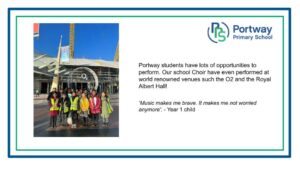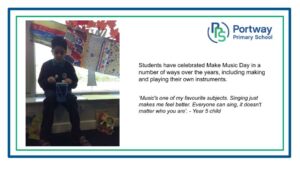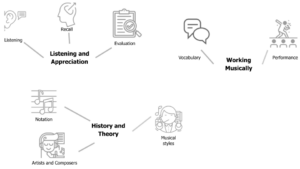Music
Music is an exciting and integral part of life at Portway Primary School. Music inspires creativity and develops essential skills for improving confidence and self-expression, therefore we aim to provide a wide range of musical opportunities for all through our ambitious curriculum and extra-curricular opportunities.
Students develop their understanding of different musical concepts and skills, as well as learn to appreciate music from a range of genres and composers. Students have opportunities to develop and present their performance skills at a number of concerts throughout the year.
Music is introduced to children in EYFS and is taught weekly across the school. Year 5 and 6 students are taught violin as part of a local cluster program. Year 6 students also have the opportunity to extend their learning in a weekly after school violin club. All students take part in a weekly Music assembly where musicianship is developed through singing a range of styles and taking on different parts, rhythmic warm ups and listening activities. Children that are interested in progressing their musicianship further can join the KS2 Choir (Y3-Y6), which rehearses weekly after school to prepare for performances throughout the year.
We recognise the power music has to support learning throughout the curriculum with children using song to learn concepts in all subject areas. This enables a fun way to remember facts and information about other subjects as diverse and Mathematics and Geography.
Our music unit coverage provides detailed information as to how we teach all elements of the curriculum across all year groups at our school.


How is music taught at Portway?
The Music curriculum is designed to help pupils form a Music Mental model within their long-term memories.
Schema theory states that all knowledge is organised into units. A mental model is, therefore, a conceptual system for understanding knowledge.
Our Music Mental model is a way of organising Music substantive and disciplinary knowledge in a meaningful way; it is an appreciation of how facts are connected and the ways in which they are connected. It is distinct from information, which is just isolated facts that have no organisational basis or links.
Big Ideas help form the basis of the mental model. Big Ideas are key concepts that underpin the subject. There are three Big Ideas in Music:
- Listening and Appreciation (Develop the ability to listen carefully to a variety of live and recorded music and offer opinions about what they are listening to with reference to styles, instruments played, musical styles and artists)
- History and Theory (KS2) (Use standard notation to record and play music recognising the key features of a range of musical styles, artists and composers)
- Performance (including composition and improvisation) (Use the skills of playing a variety of tuned and untuned instruments musically and composing in planned performance or through improvisation)
Each Big Idea has knowledge strands which help to strengthen the mental model. Learning knowledge in each of the strands allows pupils to express and demonstrate their understanding of the Big Idea, which gradually develops as pupils return to them over and over again.

Please click here to send our music development plan.
